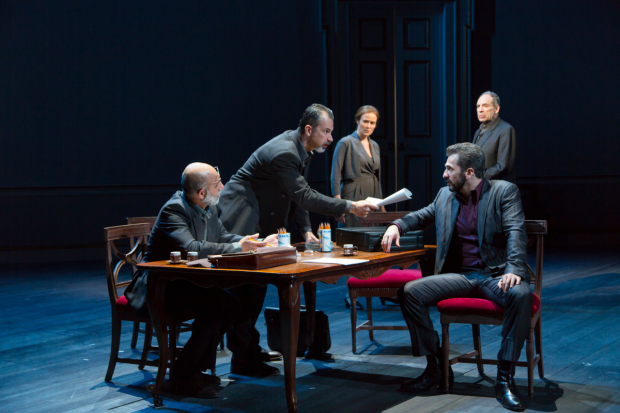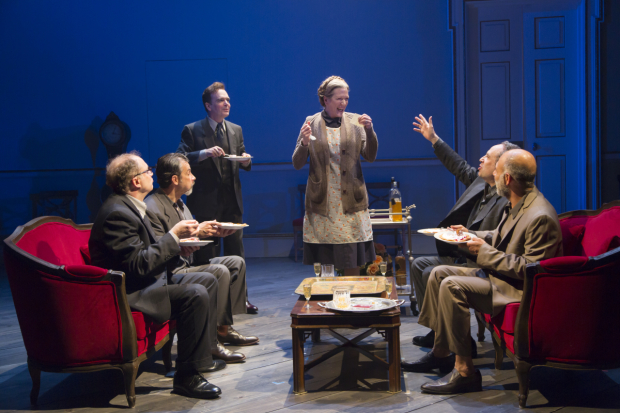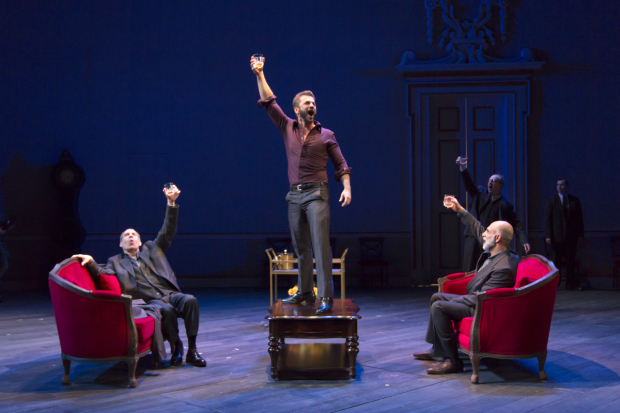Oslo

(© T. Charles Erickson)
"You don’t make peace with the people you have dinner parties with," Norwegian diplomat Terje Rød-Larsen asserts in the first scene of J.T. Rogers' Oslo. "You make peace with the people who bomb your markets and blow up your buses." But what happens when you invite those people to dinner, specifically one capped off with delicious Norwegian waffles and washed down by a river of scotch? Dramatizing the secret negotiations between Israel and the Palestinian Liberation Organization that took place outside the Norwegian capital from 1992-93, Oslo answers that question in three hours of gripping and insightful theater that is bound to make even the most die-hard partisans in the seemingly never-ending conflict between Israel and Palestine reevaluate everything they think they know.
The show played an acclaimed run last summer at Lincoln Center Theater's off-Broadway space, the Mitzi E. Newhouse Theater. Original cast intact and with modest changes to the script, it has moved upstairs to Broadway's Vivian Beaumont Theater where it seems destined to become a contender for this year's Tony Award for Best Play.
The story unfolds through Larsen (Jefferson Mays) and his wife, Mona Juul (Jennifer Ehle), also a diplomat. Larsen believes that the U.S.-facilitated talks between Israel and Palestine are destined to fail because they are organized under a model of "totalism," in which all issues are discussed by all parties in a highly public way. Larsen believes that a gradualist approach (one issue discussed at one time) in a less formal setting would lead to more fruitful results and help build trust between parties.
To test this theory, he sets up a secret meeting between P.L.O. finance minister Ahmed Qurie (Anthony Azizi) and Israeli economics professor Yair Hirschfeld (Daniel Oreskes). True, Hirschfeld is not a government official, but he regularly meets with deputy foreign minister Yossi Beilin (Adam Dannheisser), who gives him marching orders. This roundabout back channel surprisingly leads to progress as both the Palestinians and Israelis make concessions they were unwilling to make before. Could it possibly have something to do with the excellent cooking of Toril Grandal (Henny Russell), the housekeeper at the Norwegian estate at which the talks are taking place?

(© T. Charles Erickson)
As the negotiations progress, Israel adds higher-level delegates, like Uri Savir (Michael Aronov) and Joel Singer (Jeff Still at the performance I attended). Foreign Minister Shimon Peres (Daniel Oreskes) joins for the final round, an all-night session that results in the Oslo Accords, a series of agreements that allow the P.L.O. to return from exile and establish the Palestinian Authority in the West Bank and Gaza. Rogers humanizes this history by giving us an intimate sense of the individuals involved. It's a fitting approach since the success of the Oslo talks very much hinged on the participants learning how to appreciate the individuals representing what had previously seemed like a monolithic group.
As Israel's Uri Savir, Aronov portrays the most memorable of those individuals. Aggressive, macho, and abrasive in his humor, he often seems more like a card shark than a career diplomat (costume designer Catherine Zuber outfits him in a flashy suit worn over an open-collar shirt). Azizi brings a more reserved approach to Qurie (Savir's primary counterpart), but he is willing and able to confront the Israeli toe-to-toe if he has to. Their shouting matches are epic, which makes the genuine respect the two men seem to have for each other feel all the more profound.
As the facilitator of these meetings, Larsen occasionally gets caught in the crossfire and it is painful to watch: "I will not stand here and be your punching bag," he tells Qurie and Savir, like a little boy who knows he is about to be throttled. Mays endows Larsen with a gentleness that dispels any suspicion we might have about his character's less-than-altruistic motives (he is a man with a theory to prove, after all). We know that he truly wants to help. Ehle plays his better half with a maternal tenderness that can quickly transform into the wrath of a Norse goddess when she is provoked. We understand instantly why all these hot-blooded Mediterranean men love her.
Best known for his lavish musical revivals (including the last occupant of the Beaumont, The King and I), director Bartlett Sher brings an austere touch to this production that keeps the show flying along at a cinematic clip. Michael Yeargan's set is an empty blue room into which a few key elements of furniture are rolled to instantly create cafés, hotels, and Norwegian castles. 59 Productions brings context to the stage, projecting video of the events on the ground in the Middle East on the back wall during transitions. Sher maintains an air of tension over the stage, making us ever aware that these negotiations could collapse like a Jenga tower at any moment.

(© T. Charles Erickson)
While the negotiation scenes are nail-biting, Rogers, Sher, and the cast create a genuine sense of camaraderie in the after-hours scenes: The men retire to a drawing room to drink and tell jokes, discovering that their senses of humor aren't all that different from that of their adversaries. We begin to understand that these talks only succeeded because both sides wanted a peaceful future for their children and assumed the same from their longtime adversaries. Even if you don't much care about Israel and Palestine, you cannot help but be moved by this story about the discovery of shared humanity.










